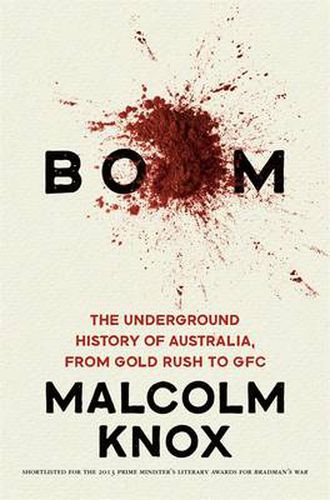Readings Newsletter
Become a Readings Member to make your shopping experience even easier.
Sign in or sign up for free!
You’re not far away from qualifying for FREE standard shipping within Australia
You’ve qualified for FREE standard shipping within Australia
The cart is loading…






Mining divides the country - development against conservation, north-and-west against south-and-east, pro-tax against anti-tax. It’s an important industry, but why do passions run so high? What does mining really mean to us? And how much do we understand about our underground history? Although we favour the romantic vision of Australia riding to prosperity on the sheep’s back, in reality we have always owed as much to the shovel. The gold rush kick-started the nation, populating our cities and building our regional centres, and our fortunes have both risen and fallen according to what we’ve been able to dig from the ground. To describe mining’s place in the Australian story, Boom presents not a textbook history, but a narrative of the people behind the facts and figures, from the eccentric loners who staked the first claims to the emergence of the modern mega-magnates. It takes us deep underground with men working in extraordinary danger by candlelight, and on the extraordinary journey 25,000 tonnes of the raw Australian landscape makes from the Pilbara to Shanghai. Boom reveals the history of mining as the Australian story, for better or worse. Insightful, compellingly readable and full of extraordinary characters, it shows how mining and miners have shaped our history and gripped our imagination through boom and bust.
$9.00 standard shipping within Australia
FREE standard shipping within Australia for orders over $100.00
Express & International shipping calculated at checkout
Mining divides the country - development against conservation, north-and-west against south-and-east, pro-tax against anti-tax. It’s an important industry, but why do passions run so high? What does mining really mean to us? And how much do we understand about our underground history? Although we favour the romantic vision of Australia riding to prosperity on the sheep’s back, in reality we have always owed as much to the shovel. The gold rush kick-started the nation, populating our cities and building our regional centres, and our fortunes have both risen and fallen according to what we’ve been able to dig from the ground. To describe mining’s place in the Australian story, Boom presents not a textbook history, but a narrative of the people behind the facts and figures, from the eccentric loners who staked the first claims to the emergence of the modern mega-magnates. It takes us deep underground with men working in extraordinary danger by candlelight, and on the extraordinary journey 25,000 tonnes of the raw Australian landscape makes from the Pilbara to Shanghai. Boom reveals the history of mining as the Australian story, for better or worse. Insightful, compellingly readable and full of extraordinary characters, it shows how mining and miners have shaped our history and gripped our imagination through boom and bust.
Just as I finished reading Malcolm Knox’s comprehensive history of mining in Australia, the High Court dismissed a challenge by Fortescue Metals Group to the validity of the mining tax. Despite the facts that Fortescue has not paid any of the tax thus far and Australian mineral rights belong to the Commonwealth, the iron ore company launched the case because they believed the tax to be ‘unfair, discriminatory and complex’.
Knox writes in Boom that ‘the argument over mining taxes is a lightning rod for deeper conceptions of Australian values’, and his book traces the history and development of these values from the individual prospectors of the nineteenth-century to the multinational corporations of today, detailing the fraught relationship mining has had with Aboriginal people, immigration and the environment. Knox suggests that mining industry workers, throughout history, have seen themselves as individual capitalists. This explains why, when compared to other industries, miners’ unions are more sympathetic to their employers, and why so many workers sided with their bosses to oppose the mining tax.
Knox goes into a lot of eye-opening detail regarding the technicalities of mining; a description of a train at an iron ore mine includes precise numerical information about its length, horsepower, fuel requirements, carrying capacity and length of journey. It is clear he has inherited his love of big machinery from his father, an engineer who once took the family to a copper mine as a holiday activity. Knox writes that ‘the majesty of the physical operation has an opiate effect’ but warns that complicated historical values are being used ‘as a weapon against dissent’.
Critically acclaimed for his fiction, Knox demonstrates a skilful ability in Boom to weave together detail, history and narrative, upholding his reputation as a masterful storyteller.